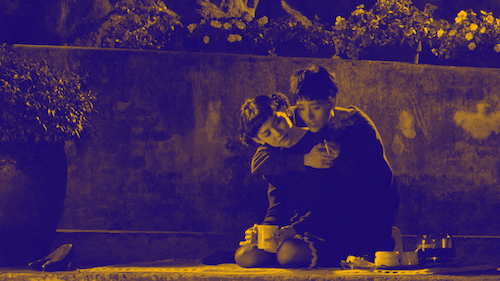Filmography Worship: Ranking Every Edward Yang Film
Written by Andreas Babiolakis
Filmography Worship is a series where we review every single feature of filmmakers that have made our Wall of Directors
One of the great minds of the Taiwanese New Wave movement (and arguably the first director to make a film within it), Edward Yang is a brilliant artist who we lost way too early. He passed away at the age of 59 in 2007 after a seven year long battle with colon cancer. He was in the middle of his first animated film titled The Wind, of which only a few minutes exists today; there have been attempts to complete the film since, and hopefully some day we can see others finish Yang’s incomplete dream. Once his cancer battle got in the way, Yang couldn’t continue making films: a crying shame considering his final feature film, Yi Yi, is a masterpiece that continues to impact the twenty first century. Nonetheless, we still had almost a dozen projects from Yang while he was alive, the vast majority of which are fantastic examples of Taiwanese cinema.
What defined his style? Yang was heavily interested in what drives humanity, be it our sinful sides via escalating tensions and downward spirals, or our empathy through the connections viewers had with the subjects on the big screen. Yang wasn’t shy with the length of his works, with the majority of his films being over two hours (and one being around four hours). With long shots, distance between us and the focal points on screen, a pinch of quirkiness, and an affinity for rock music (between the Elvis needle drops like “Hound Dog” in That Day, on the Beach and “Are You Lonesome Tonight?” being pivotal for the appropriately titled A Brighter Summer Day, to the music of The Beatles making a brief appearance in Expectation), Yang is not just a student of the human experience: he is as stylish as cinematic artists come.
It may be simple to clump the greatest films Yang made right at the top of an all time ranking, but I hope a major takeaway you have from this list is just how strong his filmography always was. All of his feature length films are must watches for different reasons, and the remnants of whatever else remains are worthwhile as well (not that there’s much). I’m including as much as I can here, like the recording of a stage production and a television miniseries. I will not add The Wind as it was never finished (and far too little exists to make a proper judgement) or Growth Period (another recording of a stage play) which is mostly lost save for a few minutes. What remain are ten releases, ranging from noble attempts from a young mind to some of the finest artistry in film history. Here are the films of Edward Yang ranked from worst to best.
10. Likely Consequence
Thanks to the Criterion Collection, we have access to this recording of Yang’s play Likely Consequence. At around forty five minutes in length, this production — one where the stage is surrounded by its audience and there are no sets or major props — is an intimate, bare bones study in a similar way that Growth Period likely is (but we have very little proof of it, sadly). Even though we aren’t in the presence of these performances and the rough quality of this recording distances us from the play even more, Likely Consequence is still an interesting production that showcases Yang’s ability to plant us within the minds of people who hurt others and also get hurt. I’d recommend this only to the Yang completionists out there, but I’d say that the worst finished film (I’d consider this one) in Yang’s career is still gripping.
9. Duckweed
The very first film Yang ever directed is technically an episode in the Eleven Women miniseries; Yang’s entry, the two-and-a-half hour film, Duckweed, is a bit of a love letter to his motherland of Taiwain as we follow a protagonist to the capital city Taipei. This is an incredibly difficult film to track down, and you’ll have to go the extra mile to get subtitle files working (if you catch my drift), so this may be another one just for the Edward Yang aficionados who want to go through the effort in order to even watch this project (hopefully it’ll be remastered one day). Those who pull this watch off will get a gorgeous, sublime sneak peek at a director who was figuring out what kinds of stories he wanted to tell (while being quite strong from square one). It’s a bit over long as Yang wasn’t as tight with his long form storytelling just yet, but Duckweed is still a treat.
8. In Our Time — Expectation
I won’t be judging all of In Our Time, which is an anthology film featuring segments by Yang, Tao Te-chen, Yi Chang, and Ko I-chen. Instead, I’ll focus solely on Yang’s short film within a film, Expectations, which feels a bit like a seedling for future films like A Brighter Summer Day (particularly the coming of age element and the coming to terms with the ways of reality). What I will say is that Expectations is the best of the four shorts (although they’re all worth checking out), and seeing Yang crafting such a large feeling story within a brisk half hour runtime is quite something. It was the first proper film project Yang was ever a part of, and it was the final glimpse into the career that would come shortly afterwards.
7. Mahjong
We’ve reached the official feature films Yang released, and the weakest one, Mahjong, is still great. His only release to heavily dabble in English (featuring the always lovely, nineties star Virginie Ledoyen in a main role), Mahjong feels like a blending of styles, cultures, and worlds; this was the last film he released in the nineties and it shows with its colour grading and camerawork. While Mahjong is a little bit flawed with how it blurs its storylines and themes together, it is still quite a ride for crime film enthusiasts (especially thanks to the comedic, hysterical nature that shows a different side of Yang’s craft that I’m sure many aren’t too familiar with). While most of Yang’s films deal with chain reactions, Mahjong goes about this technique in a bit of a dangerously playful way that feels far less consequential than his stronger works.
6. A Confucian Confusion
On the topic of comedies by Yang, we have the satire A Confucian Confusion which feels a bit more in line with what the director was hoping to achieve with the commentary of how humans behave. As tensions get high and characters boil over in this fable about the dog-eat-dog ways of the world, A Confucian Confusion reveals itself as a dense text on those who realize the big game of life and how to best go about it. While maybe less laugh-out-loud funny than Mahjong, A Confucian Confusion feels more self aware and cognizant of why we act out in the ways that we do. As Yang was watching his beloved city of Taipei grow at a rapid rate, he also questioned how humans get swept away by the speed of innovation and progress to the point of detriment; he was on to something.
5. The Terrorizers
By the time Yang reached The Terrorizers (his last film of the eighties), he was ready to explore how complicated his narratives can get. We have a web of stories here that weave in and out of one another; we even lose sight of what is real by the end of the film, leaving us to wonder the truths of all that came before in this fever dream of a feature. For a director who entwined literal events with realistic allegories, watching Yang operate at this metaphysical level is quite something; it’s a damn shame that we couldn’t see Yang operating in such a way again. De-compartmentalizing The Terrorizers is half the experience: you’ll learn a bit about yourself whilst figuring out this wonderful film.
4. That Day, on the Beach
This is a special film in a myriad of ways. It is Yang’s first full length release as sole director. This is considered the start of the Taiwanese New Wave movement. It’s also a spellbinding, gorgeous release by Yang who proved that he had it all figured out from the very beginning. That Day, on the Beach is a three hour poetic epic that feels like it is radioed in from another reality, as we watch mirrored lives seemingly frozen in time (despite the theme of aging and life). Every shot is breathtaking (cinematographer extraordinaire Christopher Doyle was a part of the photographic team here; say no more) and feels like our inner spirits have been placed on the big screen. While other Yang films dive into the despair or desperation of humans at their lowest points, That Day, on the Beach feels like his most heartbreaking and empathetic: as if our inner monologues have been heard and answered. That Day, on the Beach is exquisitely existential.
3. Taipei Story
If That Day, on the Beach wasn’t Yang’s breakthrough film, then Taipei Story most certainly was. A written collaboration including Yang and other Taiwanese greats Hou Hsiao-hsien (who also stars in the film alongside singer Tsai Chin) and Chu T’ien-wen, Taipei Story is the zeroing-in on a particular story within the acknowledgement of the titular city. This is a juxtaposition of a story of one’s stomping grounds and a personal, vulnerable, family drama within the massive setting. We view people and their different motivations, be they a push for what is to come or the nostalgic grip on yesteryear. Even if you never got around to the longer, more ambitious films in Yang’s career, Taipei Story is enough evidence that the filmmaker perfectly understood how fascinating human beings are both as individuals and as a part of the same species experiencing the world together.
2. Yi Yi
We’ve reached the inevitable heavy hitters that Yang is known for. Yi Yi is already considered a perennial film of the twenty first century and a definitive, prophetic look at a century that Yang barely had the opportunity to see for himself. One of the handful of films of Yang’s that deals with a long form path that leads towards devastation, I do think my number one pick is a marginally stronger film but Yi Yi feels even more majestic with its waltz toward hardship and reality: we all have to face death, be it that of loved ones or our own mortality. This generational observation on how life goes on with or without us is impossible to not be affected by. It is as stunning as it is gut wrenching, as mysterious as it is blatant, and as massive as it is dialed in. A fitting swansong if there had to be one so early in the career of a master with much more to give, Yi Yi is a masterpiece by Yang that only radiates more brilliance as time passes and we get older. Life is precious, and it is even more so when you know that we can go at any second.
1. A Brighter Summer Day
I’m placing A Brighter Summer Day molecules above Yi Yi, but for me I will always view the former as Yang’s magnum opus. This four hour crime epic is one of the most calculated looks at the many particularities that lead towards disaster, as if we are on a downhill trajectory and seeing all the red flags that could have been avoided along the way. As we follow a juvenile delinquent and his girlfriend amidst the clashing of two high school gangs in Taipei (this sounds like a Romeo and Juliet affair, but this film is unfortunately based on true events that took place in the sixties and left an impression on a young Yang), A Brighter Summer Day never feels phoned in or artificial. We feel like we are truly watching living people, and the misfortunes that follow somehow come out of nowhere despite the ample warning signs and shots.
As perfect as crime films, dramatic epics, Taiwanese cinema, and nineties releases get, A Brighter Summer Day is a monumental release you feel the entire impact of while you watch it. You are bowled over once it is finished. You’ll never forget where you were, who you were with, or how you watched the film; having only seen the film once, I still remember nearly all of its nearly two hundred and forty minutes with precise details. The pretty world created here is infiltrated by hatred and sin: a spellbinding dichotomy of the wonderful world we’re blessed to have, and the unforgiving society we are forced to grapple with within it. Edward Yang has a near perfect filmography if you only consider the finished feature length releases he had, but A Brighter Summer Day is so incredible that it feels impossible to top. If that’s its power within Yang’s filmography, you can only imagine how tall it stands within film history. It is the kind of motion picture that reminds you of the highest reachable bar, and seeing Yang reach it with apparent effortlessness is one of film history’s greatest experiences.
Andreas Babiolakis has a Masters degree in Film and Photography Preservation and Collections Management from Ryerson University, as well as a Bachelors degree in Cinema Studies from York University. His favourite times of year are the Criterion Collection flash sales and the annual Toronto International Film Festival.













